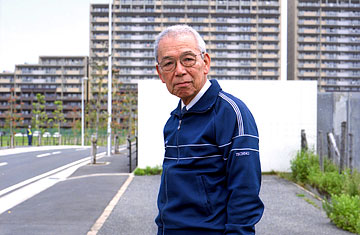
Jin Matsushita, now 73, has seen far better days
December 29, Tokyo, Japan
In the autumn of 1989, Jin Matsushita was making more money than he ever dreamed he would; more money, indeed, than he thought he'd ever need. After joining Yamaichi Securities straight out of high school, Matsushita had worked his way up from lowly office boy scribbling stock prices on a chalkboard to fully fledged stockbroker in Yamaichi's nationwide army of salesmen — and what a golden time it was to be trading stocks for one of Japan's largest securities firms. Japanese companies like Toyota and Sony were becoming globally dominant, while the country's businessmen, flush with cash, fanned out across the world, snatching up iconic properties like New York City's Rockefeller Center, the fabled Pebble Beach golf course and Hollywood's Columbia Pictures. Matsushita himself was earning an annual salary of $150,000 plus a bonus that often exceeded his base pay. Everyone was getting rich. The Nikkei 225 stock index soared to an all-time high of 38,916 on Dec. 29, 1989. "It was a kind of miracle, I suppose," says Matsushita.
It was the kind of miracle that doesn't last: an economic bubble that soon burst. What followed was collapse and years of torpor that came to be known as Japan's "lost decade." Neither Tokyo property prices nor Japanese stocks — nor the Japanese people, for that matter — have ever fully recovered. The Nikkei index on June 15 closed at 10,040, an astonishing 75% below its 1989 peak. And Matsushita, now 73, is working the night shift at a convenience store just to make ends meet.
Looking back, it's odd that so few people saw the bust coming. I certainly didn't. In 1989, I was Tokyo bureau chief for Newsweek, and I lived through the bubble years acutely aware of what strange days they were, yet without quite realizing those days were numbered. It should have been obvious that such excess was unsustainable. At one point, the combined value of Tokyo real estate was said to eclipse that of the entire U.S. In Japan you could easily spend more than $1,000 on a round of golf or on an evening in a hostess bar in Ginza. All this reinforced the notion that Japan was an industrial giant that seemed able to outcompete even the mighty U.S. George H.W. Bush, then U.S. President, came to Japan with trade at the top of his agenda, only to famously throw up on Kiichi Miyazawa, Japan's Prime Minister, during a state dinner. Miyazawa gently cradled Bush's head as the stricken President slumped in his chair, an image that we journalists couldn't resist using as a metaphor. The country that had been vanquished militarily now seemed poised to conquer the world economically. The Atlantic Monthly captured the angst this caused in a two-part series entitled "Containing Japan."
Why did serious publications think Japan needed to be contained? Because at the time, it seemed as if its politicians, policymakers and business leaders had patented a superior brand of capitalism. In less than two generations, the country had climbed out of the wreckage of war to become the world's second largest economy. Books like Japan as Number One detailed how different its economic system was from that of the laissez-faire U.S. — the government directed capital into key industries and allowed powerful business groups, called keiretsu, to exclude competitors from domestic markets, while Japanese companies made relentless inroads into Western markets. Americans who once scared themselves silly watching news footage of phalanxes of Soviet troops parading through Red Square instead made themselves queasy by watching phalanxes of Toyota workers performing calisthenics before hitting the factory floor.
Technology and money and power were flowing across the Pacific to Japan, and salarymen — guys like Jin Matsushita — were among the lucky beneficiaries. Tokyo in those days was a gilded city, where restaurants sold sushi sprinkled with gold flakes. Other foreign correspondents would cover wars and risk getting shot. In Tokyo, as the dollar sank in value against the yen, the greatest risk I faced was having a heart attack when the bill for dinner arrived.
Japan was exotic, and it could also be insular and xenophobic. When foreigners stayed out past midnight, after the subways in Tokyo closed, they risked being unable to get a cab home. I was once out carousing into the morning hours with a couple of friends from Japan's Ministry of Finance — the élite among Japan's powerful bureaucrats — when we tried to flag a taxi. I told my friends no driver would stop unless I hid in the shadow of a nearby building. "No, that's not true," one of them protested. I hid, and within seconds a cab pulled up for my Japanese companions. I jumped into the backseat, much to the dismay of the cabbie. My buddy expressed shock. "What a racist country we are," he muttered. I laughed. This wasn't racism, it was capitalism. Cab drivers assumed a foreigner wasn't going very far, whereas the average salaryman lived some distance from the center of town, guaranteeing a big fare. Like everything during the bubble, it was all about the money.